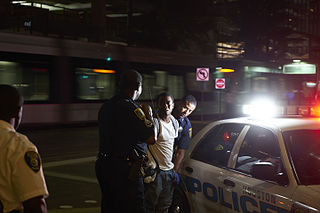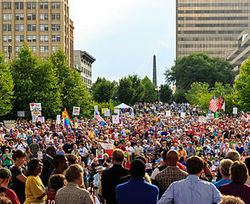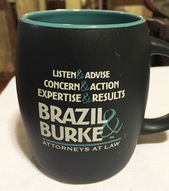 Asheville criminal defense attorney Meghann K. Burke
Asheville criminal defense attorney Meghann K. Burke 2016 has been a turbulent year for North Carolina. This year, our state’s legislature enacted the controversial law HB2; protesters have been arrested at political rallies; police shootings in Asheville, Charlotte and other cities have resulted in explosive protests and civil disobedience.
Unfortunately, many people find themselves handcuffed and detained in jail when they participate in protests. You may have found yourself ticketed for disorderly conduct and hoping your disorderly conduct charge could be dropped. Like other Asheville residents, you may find yourself questioning how you could be arrested for exercising your Constitutional rights.
Unfortunately, many people find themselves handcuffed and detained in jail when they participate in protests. You may have found yourself ticketed for disorderly conduct and hoping your disorderly conduct charge could be dropped. Like other Asheville residents, you may find yourself questioning how you could be arrested for exercising your Constitutional rights.
Why do people get arrested at protests? How can police arrest protestors?

Doesn’t this infringe on protesters’ First Amendment rights? Not exactly. While every American has the right to peaceful assembly, this right is not without its terms and conditions. For example, the U.S. Supreme Court has recognized the right of states to restrict the “time, place, and manner” of protests.
Protesters are not arrested for “protesting.” For example, in August 2016, eight people were arrested for disorderly conduct when they protested the Asheville police shooting of a black man. If you are arrested at a protest, it will probably be for misdemeanor offenses like this, such as:
Protesters are not arrested for “protesting.” For example, in August 2016, eight people were arrested for disorderly conduct when they protested the Asheville police shooting of a black man. If you are arrested at a protest, it will probably be for misdemeanor offenses like this, such as:
- First- or second-degree trespass
- Failure to disperse on command
- Impeding traffic
- Disorderly conduct
- Rioting
- Inciting to riot
- Unlawful assembly
How not to get arrested at a protest
 A protest in downtown Asheville
A protest in downtown Asheville Some groups plan acts of civil disobedience, such as sit-ins, to protest unjust policies or incidents. Getting arrested is often a planned outcome of this type of protest. However, most people who show up to protests simply want to exercise their First Amendment rights without ending up in handcuffs or zip-ties.
Some things to keep in mind if you want to avoid getting arrested at a protest:
Keeping to a traditional public forum such as a public sidewalk or park is another way to avoid arrest. Protests in these areas do not require a permit, whereas protests in streets do. Police can and often will remove protesters from government buildings.
Some things to keep in mind if you want to avoid getting arrested at a protest:
- Keep back from entrances and exits of buildings
- Do not block hallways or corridors if you are protesting inside a building
- Do not damage any property. This includes acts like marking or defacing buildings.
- Do not interfere with the rights or safety of other people
- Avoid “rude or riotous” speech, like swearing or insults
- Do not make threats or fight
Keeping to a traditional public forum such as a public sidewalk or park is another way to avoid arrest. Protests in these areas do not require a permit, whereas protests in streets do. Police can and often will remove protesters from government buildings.
Contact an Asheville criminal defense attorney
If you’ve been charged, issued a citation, or fear punishment for disorderly conduct after a protest, you probably have concerns about your criminal record and negative impacts the charges might have on your life. The skilled criminal defense attorneys at Brazil & Burke have years of experience in dealing with misdemeanor charges and civil rights cases. Give us a call today or fill out the contact form below to schedule a consultation where an attorney will evaluate your case and develop a plan to minimize the effect of criminal charges on your work, school, and personal life.

